![]()
2025
This page presents reviews of the performances that took place in 2025. We would like to express our gratitude to the authors for their invaluable contributions.
Copyright notice: The reviews published on this page are the intellectual property of the respective contributors and are subject to UK and International Copyright Laws. Their use/reproduction without the authors’ explicit permission is illegal.
|
Performed on 18 January 2025
Anja-Rosa Thöming
The Opera in Graz (Austria) celebrates its founding 125 years ago with the first performance at this theatre of Les Troyens by Hector Berlioz. This is an impressive undertaking, performed in a rousing manner by all the participants; one even has the impression that the musical beauties of the score, its luminous sounds and rhythmic vitality generate a sense of exhilaration and joy that such a work should exist! From his childhood Berlioz was under the spell of the Latin verses of Virgil, on whose ‘Aeneid’ the libretto is based, and he identified with his heroines Cassandra and Dido to the point of infatuation.
The conductor Vassilis Christopoulos leads the musicians, soloists and chorus through the rich score with masterly assurance, even though the arias and ballets have been cut to a considerable extent, and this also affects the internal musical structure of the work (see below for the list of cuts made). This sets a low bar as regards fidelity to the composer’s original score, but may be argued to be tolerable if it leads listeners to discover a world of opera that they did not know.
The founding charter of the Graz Opera House of 1899 proclaimed: ‘May German art always be cultivated in these halls and the glory of our great people be proclaimed far and wide from this place’. Now this Berlioz evening deals with the sites and glories of the ancient Mediterranean. Troy is about to fall. In Act I, after a ten year siege, the proud city pauses to celebrate the supposed withdrawal of the Greeks. But the people are so misguided that they bring the wooden horse with the hidden Greek soldiers into the city; only Cassandra foresees the forthcoming disaster. The violent death of the priest Laocoon, devoured by gigantic sea serpents, leads to a grandiose octet of terror with chorus (‘Châtiment effroyable!’, no. 8 in the score).
The director Tatjana Gürbaca gives a hint as to how the Trojans’ blindness could have come about, by showing Priam as a decrepit king who is no longer in possession of his senses. His son, the Trojan hero Hector, is dead, and in an impulsive decision, Enée (Aeneas) determines to bring the mysterious horse to the temple (no. 9). Through a simple lighting device a toy horse is turned into a gigantic projected shadow. This solution suits the beautifully simple stage design (by Henrik Ahr), which consists of a slightly sloping, revolving wooden platform and a wooden back wall. The costumes (by Barbara Drosihn) are also unpretentious; as a result of the war all the characters wear sturdy boots and coats that are stylistically timeless (see the illustrations below).
One of the most moving French arias for mezzo-soprano is Cassandre’s great scene and aria, ‘Les Grecs ont disparu! / Malheureux Roi!’ (no. 2). Mareike Jankowski performs the complex role without tearful self-pity but rather fills it with energy. Her misfortune, that no one believes her prophecies, is reflected in characters from the people moving with stylised gestures. In this way, her person is objectified: her suffering has superhuman and so to speak ‘mythical’ character. Her dead brother Hector walks calmly among the blind everyday people with his bare, mutilated upper body.
Tatjana Gürbaca stages this great work with a light touch as it were; she does not look for shocking images for the unfolding tragedy, but finds precise and expressive actions. When the grieving Andromache, Hector’s widow, appears, Cassandre speaks encouragingly to little Astyanax, whose terrible fate she alone suspects (no. 6). Her life ends - unlike in the myth - in the collapsing walls of Troy (no. 16). She transforms the Trojan women’s paralysing fear of the Greeks into a feeling of triumph: they escape enslavement by committing suicide. Most of them follow her and sing a defiant, syncopated waltz marked ‘con fuoco’ (fiery), clasping each other in solidarity and stamping rhythmically back and forth. Their collective suicide using pieces of broken glass is a gruesome sight for the invading soldiers.
In Carthage, on the other side of the Mediterranean, the sun is shining (Act III). There are no worries, everyone is working on the flourishing young city and rejoicing in its popular Queen Didon (Dido), a lady with a youthful short haircut and a white trouser suit. The mezzo-soprano Anna Brull sings the aria ‘Chers Tyriens’ with vocal finesse (no. 19), and the anthem ‘Gloire à Didon’ (no. 18) makes a powerful choral sound (chorus-master Johannes Köhler). Nobody suspects that a few refugees from Troy could bring about a catastrophe; Dido’s sister Anna (sung with a clear alto voice by Neira Muhić) encourages her to fall in love at last! (duet, no. 24) Only the royal counsellor Narbal is worried about Enée (sung by Iurie Ciobanu with reliable high notes) and his Trojans.
The instrumental piece ‘Chasse royale et orage’ (beginning of Act IV) is accompanied by staged nightmares. Enée hears disturbing voices - the gods have destined him to found a new world empire in Italy. But in the duet ‘Nuit d'ivresse’ in G flat major (no. 37) he prefers to let himself be carried away to love with Dido under the audible twinkling stars of the African sky (flutes and violins, no. 36). They tenderly unite their voices, accompanied by the orchestra in a flowing but not too fast tempo. As they disappear off-stage the voice of the god Mercury is heard and warns Enée of his duty with his repeated calls of ‘Italie!’' which are followed by thunderous chords in E minor.
This time, Enée obeys the command, leaving a devastated Didon behind (Act V). In the cavernous tones of a ‘Cérémonie funèbre’, performed according to ancient ritual, the chorus invokes the gods of the underworld (no. 49). Here the singer Anna Brull surpasses herself (no. 50). The staging, on the other hand, seems not to rise to the occasion at this point, and fails to find a convincing form for Dido’s tragedy, which is also that of Carthage; it does not include the gods in the script, and thus deprives the original myth of its impact.
Anja-Rosa Thöming
![]()
According to the information supplied by Opera Graz, the following cuts were made in the performances of Les Troyens (references are to the full score in the New Berlioz Edition [NBE], volumes 2a and 2b; the pagination of the two volumes is continuous):

![]()
All illustrations are © Werner Kmetitisch
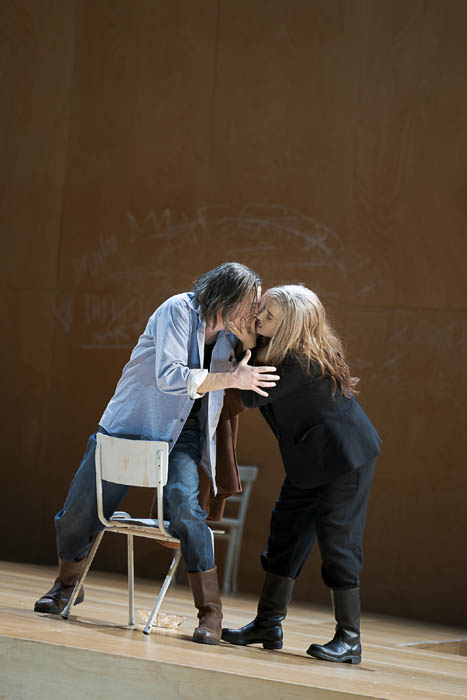
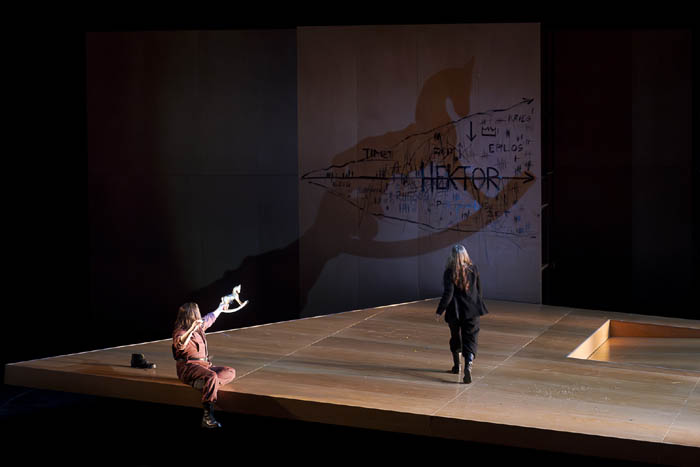
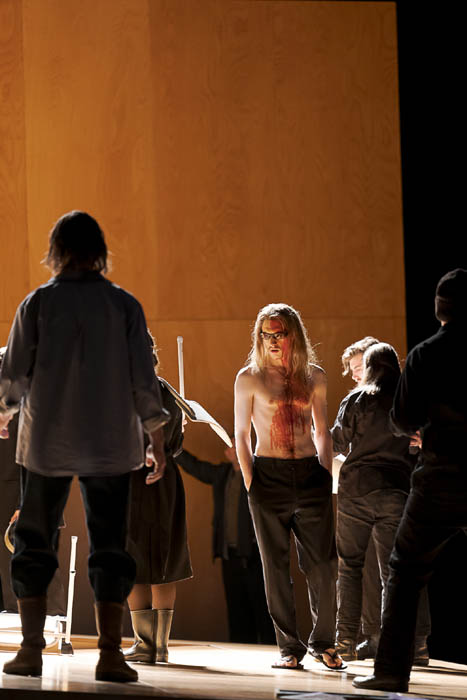
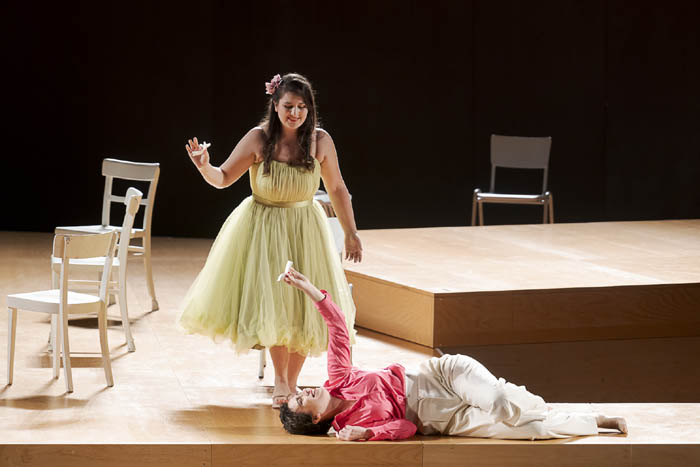
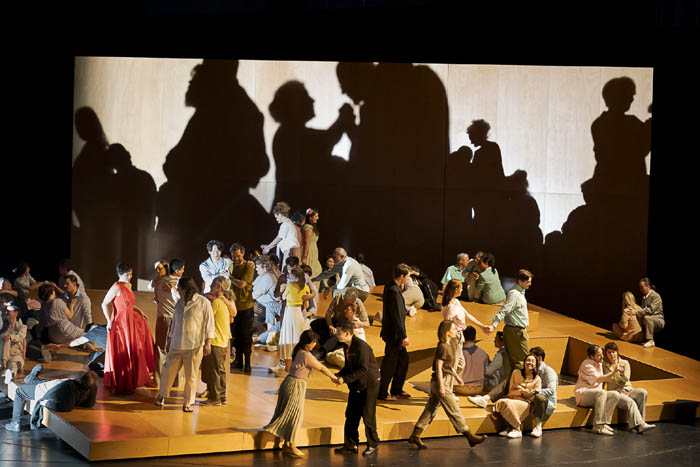
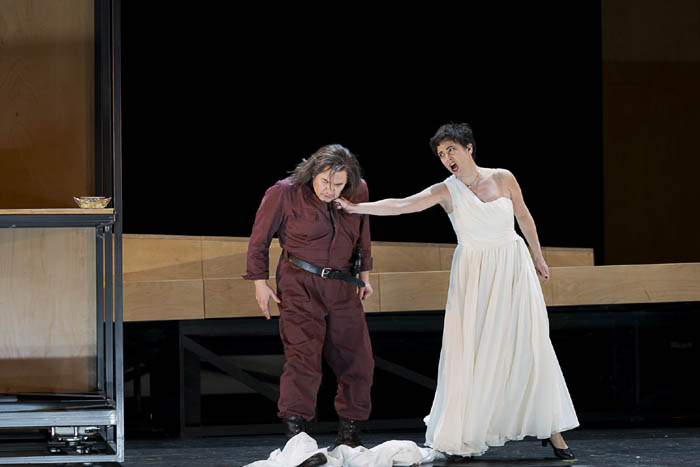
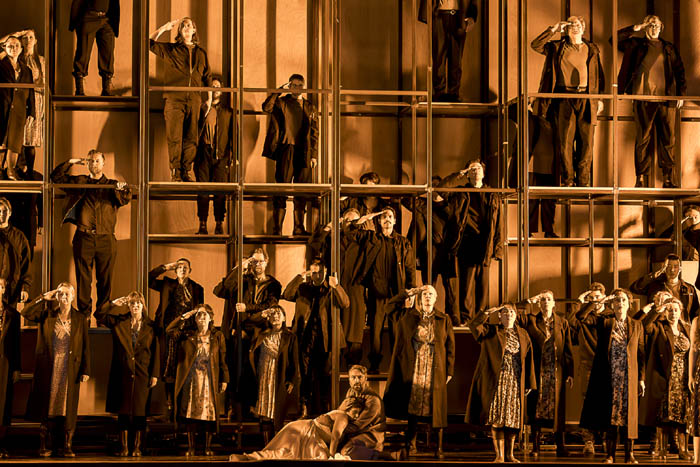
![]()
The Hector Berlioz Website was created by Monir Tayeb and Michel Austin on 18 July 1997; Reviews of live performances page created in 1999; completely reorganised on 25 December 2008.
© Monir Tayeb and Michel Austin. All rights of reproduction reserved.